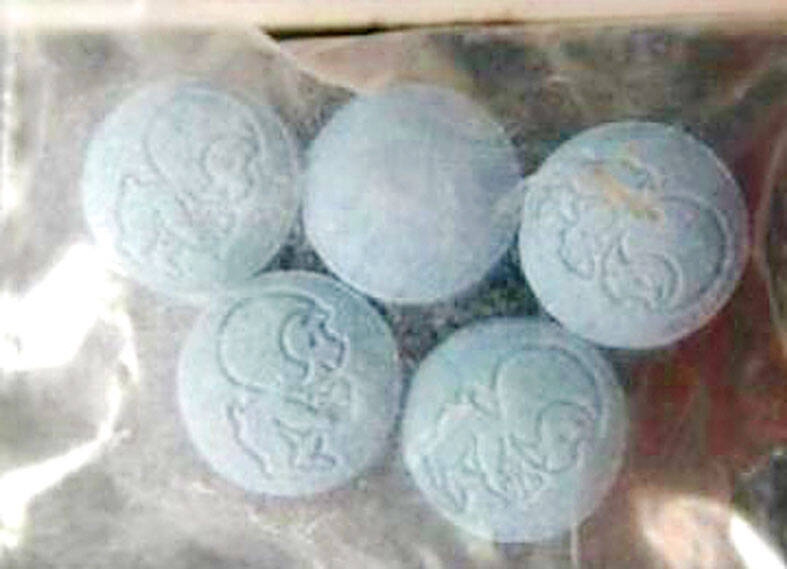Mephedrone, also referred to as “meow meow” (喵喵), has been turning up more frequently in test results of young drug users since 2019 and is now the leading cause of deaths from overdose involving synthetic or recreational drugs in Taiwan, a report by the High Prosecutors’ Office and narcotics experts showed.
The drug caused 205 deaths from 2021 to June last year, the report said, adding that the deceased were on average aged 30.
Prosecutors and experts said that meow meow has since 2019 been the most commonly found narcotic in people tested for illegal drugs, adding that it was responsible for about 60 deaths annually over the past decade.

Photo copied by Liu Ching-ho, Taipei Times
It has a strong psychoactive and stimulating effect, and induces hallucinations and amplified sensations, but it could also lead to sudden cardiac arrest and death, the report said.
There is a worrying trend in its use by young people, the report quoted prosecutors as saying.
Its cute name and fancy, colorful packaging, such as “rainbow cigarettes” or narcotic coffee powders, has lured more people into trying it and made it the “getting high” drug of choice among young people, they said.
Meow meow is a psychoactive stimulant of the central nervous system. It is chemically similar to cathinone, which comes from khat leaves, which are traditionally sold as a chewable recreational stimulant in East Africa and the Arabian Peninsula.
It causes mild loss of appetite and euphoria, and could be used to reduce fatigue and hunger.
Meow meow’s powder form could be taken orally or dissolved into a beverage, and is sometimes consumed with ketamine, experts said, adding that it is highly addictive.
Mephedrone was prohibited and controlled in 2010, after European countries and US authorities recognized its dangerous and addictive nature, the report said.
Taiwanese authorities banned and listed mephedrone as a Category 3 narcotic after a 17-year-old Taiwanese girl died after consuming it, the report said.
Test results show that cathinone and its related compounds are the main forms of new synthetic and psychoactive drugs in Taiwan, the report said, adding that use of the drugs grew significantly from 3,129 cases in 2013 to about 30,500 in 2020, with meow meow taking the No. 1 spot.
During a crackdown on illegal drugs in Taiwan in 2020, meow meow’s precursor, 2-bromo-4’-methylpropiophenone, which is also a derivative of cathinone, was the most-seized drug, the report said.

Beijing could eventually see a full amphibious invasion of Taiwan as the only "prudent" way to bring about unification, the US Department of Defense said in a newly released annual report to Congress. The Pentagon's "Annual Report to Congress: Military and Security Developments Involving the People's Republic of China 2025," was in many ways similar to last year’s report but reorganized the analysis of the options China has to take over Taiwan. Generally, according to the report, Chinese leaders view the People's Liberation Army's (PLA) capabilities for a Taiwan campaign as improving, but they remain uncertain about its readiness to successfully seize

Taiwan is getting a day off on Christmas for the first time in 25 years. The change comes after opposition parties passed a law earlier this year to add or restore five public holidays, including Constitution Day, which falls on today, Dec. 25. The day marks the 1947 adoption of the constitution of the Republic of China, as the government in Taipei is formally known. Back then the Chinese Nationalist Party (KMT) governed China from Nanjing. When the KMT, now an opposition party in Taiwan, passed the legislation on holidays, it said that they would help “commemorate the history of national development.” That

Taiwan has overtaken South Korea this year in per capita income for the first time in 23 years, IMF data showed. Per capita income is a nation’s GDP divided by the total population, used to compare average wealth levels across countries. Taiwan also beat Japan this year on per capita income, after surpassing it for the first time last year, US magazine Newsweek reported yesterday. Across Asia, Taiwan ranked fourth for per capita income at US$37,827 this year due to sustained economic growth, the report said. In the top three spots were Singapore, Macau and Hong Kong, it said. South

Snow fell on Yushan (Jade Mountain, 玉山) yesterday morning as a continental cold air mass sent temperatures below freezing on Taiwan’s tallest peak, the Central Weather Administration (CWA) said. Snowflakes were seen on Yushan’s north peak from 6:28am to 6:38am, but they did not fully cover the ground and no accumulation was recorded, the CWA said. As of 7:42am, the lowest temperature recorded across Taiwan was minus-5.5°C at Yushan’s Fengkou observatory and minus-4.7°C at the Yushan observatory, CWA data showed. On Hehuanshan (合歡山) in Nantou County, a low of 1.3°C was recorded at 6:39pm, when ice pellets fell at Songsyue Lodge (松雪樓), a